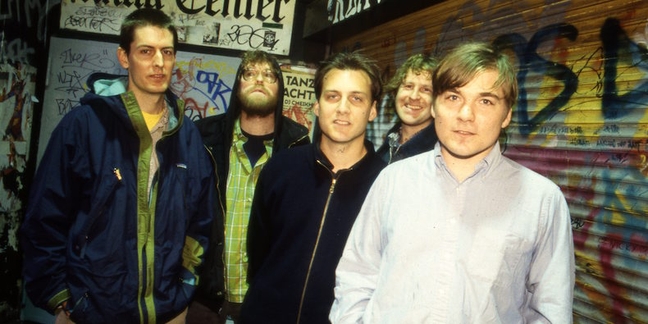
Stephen Malkmus Opens Up About Recording “Overproduced” Terror Twilight With Nigel Godrich

On the latest episode of the Talkhouse Music Podcast, Pavement’s Stephen Malkmus spoke with Emil Amos (Om, Grails, Holy Sons) about everything from indie rock’s ’90s revival to Elliot Smith’s infatuation with fine recording gear. Malkmus also talked about working with producer Nigel Godrich on Pavement’s 1999 album, Terror Twilight. Listen and find a full transcript of the passage below. He called the record “overproduced” before adding, “With that much money you should be able to make something good. We made some things that weren’t as good as they could’ve been.”
During the interview, Malkmus also mentioned working on some more country-influenced songs. “I don’t really like country as much as a lot of people,” he said. “I do like electric country like the Meat Puppets or the idea of the Eagles but not actually the Eagles. I can kinda play those songs… I don’t know why… but people seem to like my semi-country songs. They are not really country. Like country-rock, I guess.” When Amos cited “Range Life,” Malkmus replied, “Yeah. And I have more and I have new ones, and they actually sound for whatever reason… There’s a little like Sterling Morrison in my guitar solos, they’re not like country… So like I guess they’re also like Velvet Underground “fourth” style country… So I can do that.”
Stephen Malkmus on working with Nigel Godrich:
The only time we used a producer was with Nigel Godrich, who all engineers and studio people rightfully are in awe of. He’s pretty much the alpha of new-generation producers. He was interested in Pavement. He and Radiohead were fans of [Pavement] and Wowee Zowee. He told us he had time off and would like to do [Terror Twilight]. He also did Beck’s Mutations which he was really proud of. He played me some of that. So that’s when we used one and I didn’t know what that was going to entail. But he was cool. He was like “I just want my percentage points, you don’t even have to pay me a fee. I’m free and I’ve already made a lot of money and I want to work with you guys, so we’ll carry this to the end.” We paid for the studio time of course, which started to get expensive. Because he had his own, uh, standards.
First we started at the Sonic Youth studio. They also had a nice Neve board. When we got there the faders were upside down. We recorded three days and Nigel was losing his mind trying to figure this out. He couldn’t get the “Nigel” sound so we had to stop. The headphone mixes were dubious at best. There were a lot of reasons why we left [the studio]. Then we went to this place by Washington Square Park where the Beastie Boys recorded. It was on the 14th floor of this really nice apartment building. It was a small room because it was New York, but it was really nice. Super fancy. Nigel said “We’re going to do it here.” A few thousand dollars later we had 7/10 of the album. Then we still had to do overdubs. We went to England where he lives, and we went to RAK where he started. RAK is a great historical studio that Mickie Most owned. He was a hit-maker with Hot Chocolate. He knew the Yardbirds and Jimmy Page. There were three studios there, and we were in the cheaper one.
We had to get a new drummer for a couple of songs. Steve West couldn’t play these songs in time that needed to be in time. So we got the High Llamas drummer. And I drummed on one song too, but that wasn’t the one that needed to be out of time – in the right way. That was a real, classic rock, overproduced, $100,000 record. With that much money you should be able to make something good. We made some things that weren’t as good as they could’ve been. There was a big argument about the order of the songs. No one really cares about this album that much. [Nigel] had a certain order that was with a difficult song first, like Radiohead’s OK Computer that had a longer more challenging song to set the tempo. Scott in our band, and the other ones, not only did they not like that song, but they barely played on it. They wanted this easier song first, like the hit song. So Nigel was like “I’m done with this. This is the wrong move. We made a stoner album and you’re going halfway.” He’s right probably.













Recent Comments